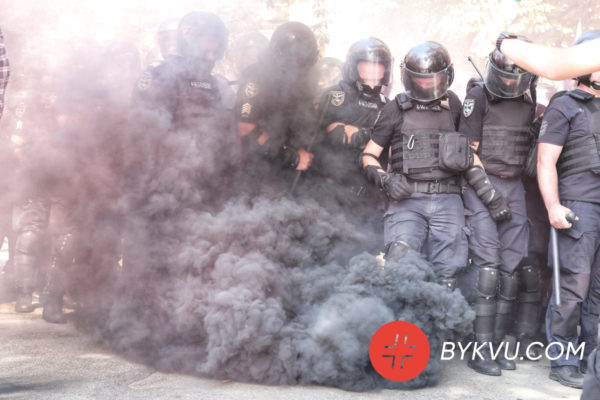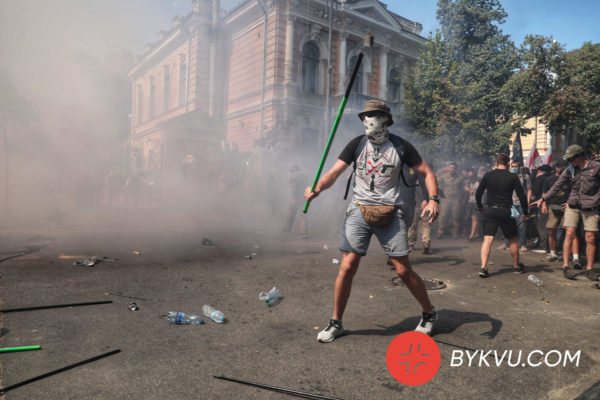The protest was not peaceful from the very beginning. Staged at the Ukrainian president’s residence in Bankova Street, the gathering soon turned violent – clashes erupted after the protesters refused bag checks demanded by the police.


Kyiv police later informed seven cops and one National Guard were injured.
According to Kuzhenlyi, who was covering the event he was confronted at the rally by a balaklava-wearing protester who angrily demanded him to leave. After the end of the event, Kuzhelnyi was overtaken by a group of people, who in an aggressive way demanded the removal of photos taken during the rally. The reporter showed his journalist ID, alluding to the attack on the journalist. However, he was kicked and punched.
The attackers recorded themselves abusing and attacking ‘Bukvy’ reporter. Later into the day their mobile phone footage emerged in the net.
З'явилося відео нападу на кореспондента #Букв pic.twitter.com/DwaJsQgfdU
— Букви (@Bykvu) August 14, 2021
Oleksandr Kuzhelnyi noted that one of the attackers, before using force against him, mentioned the attack that took place on July 21 near the court.
Upon learning of the incident, ‘Bukvy’ called the leader of the National Corps, Andriy Biletsky, to investigate the situation. The politician arrived at the scene, helped with the ambulance and police, and also assured that the attackers were not members of his organization and promised that the perpetrators would be found and punished.
Later, the attackers apologized to Kuzhelnyi under the close supervision of Biletsky. They claimed they had beaten the reporter because of ‘received false information’.
Pechersk police department opened an official probe under art. 345-1 of Ukraine’s Criminal code on charges of violence against journalist that carries punishment of up to 5 years in prison, says Kyiv police in a statement.
According to Oleksandr Kuzhelnyi, he spent two hours in the police station: officers compiled a report and attached photo and video evidence to the case.
Threats to ‘Bukvy’ reporters
This is not the first case of threats against ‘Bukvy’ journalists.
In the autumn of 2019, during a sitting of the Verkhovna Rada, ‘Bukvy’ reporter filmed Bohdan Yaremenko, the then chairperson of the Verkhovna Rada’s foreign policy committee. The MP corresponded with the prostitute on a dating website. Yaremenko first declared provocation, and then threatened ‘Bukvy’ with a criminal case.
In September 2020, Yevhen Shevchenko, a former ‘Servant of the People’ representative, threatened ‘Bukvy’ reporter because of the photo taken at a parliamentary session.
Viktor Medvedchuk, a leader of ‘OPZZh’ party, is also suing ‘Bukvy’ and personally the owners of the outlet – Kateryna Roshuk and Petro Terentyev. The lawsuit was filed in May 2019 on a scene from the film about Vasyl Stus.
‘Bukvy’ is an independent media outlet that belongs to the list of online media with the highest level of adherence to professional journalistic standards. In addition, ‘Bukvy’ is among the top media that do not place paid publications.
‘Bukvy’ study in detail the activities of the Ukrainian authorities, record every violation of the laws of Ukraine by the current President of Ukraine Volodymyr Zelensky in a separate section and focus their activities on the fight against fakes.
In particular, ‘Bukvy’ published an investigation in which they analyzed the activities of bots on Facebook, working in the interests of former Prime Minister Volodymyr Groysman. Following the publication, the Facebook administration exposed a network of bots linked to MP Andriy Derkach and ex-PM Volodymyr Groysman.
In addition, ‘Bukvy’ told how the authorities’ bot farms support President Volodymyr Zelensky and destroy his opponents. This material became the basis for the investigation of Facebook administrators. They later discovered a network of bots (105 Facebook accounts, 24 pages and 5 Instagram accounts).
‘Bukvy’ covers Russian aggression in Ukraine, which has repeatedly led to threats of blocking by Russia’s authorities. Eventually the outlet was added to a list of ‘information resources prohibited in the Russian Federation’.

 Radzivon “Gena” Batulin: Belarus is turning into North Korea
Radzivon “Gena” Batulin: Belarus is turning into North Korea 



